【新课标】Unit 8 English week Period 3 Grammar课件
文档属性
| 名称 | 【新课标】Unit 8 English week Period 3 Grammar课件 | 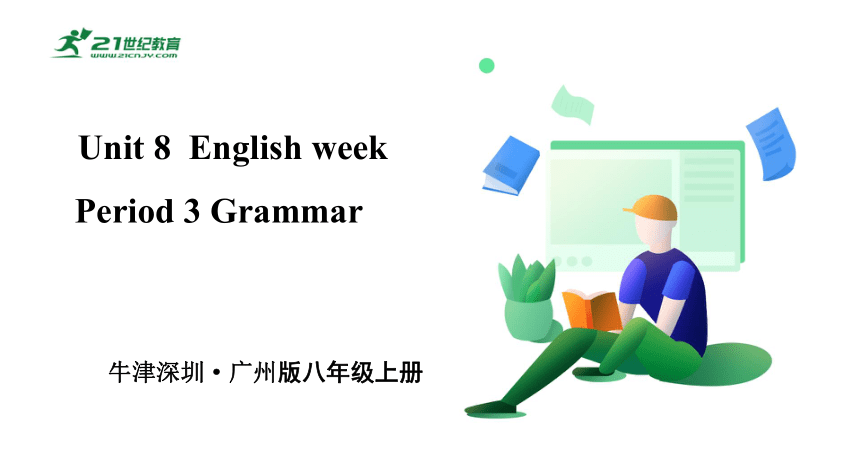 | |
| 格式 | pptx | ||
| 文件大小 | 2.2MB | ||
| 资源类型 | 试卷 | ||
| 版本资源 | 牛津深圳版 | ||
| 科目 | 英语 | ||
| 更新时间 | 2022-12-06 09:36:18 | ||
图片预览

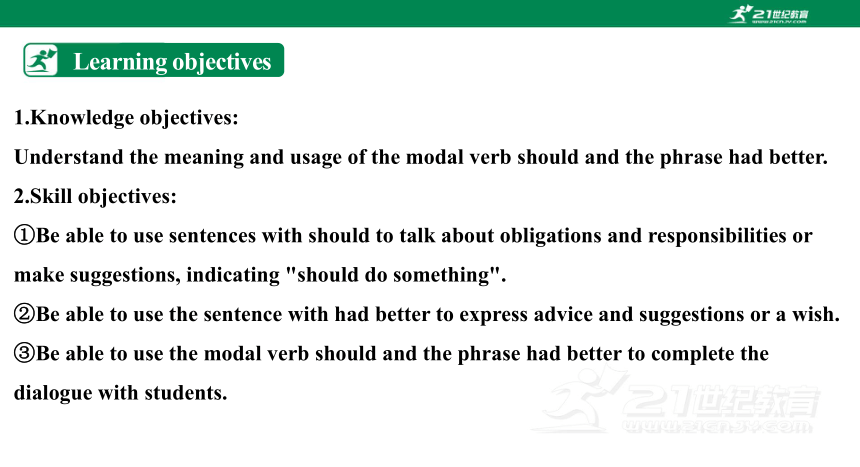
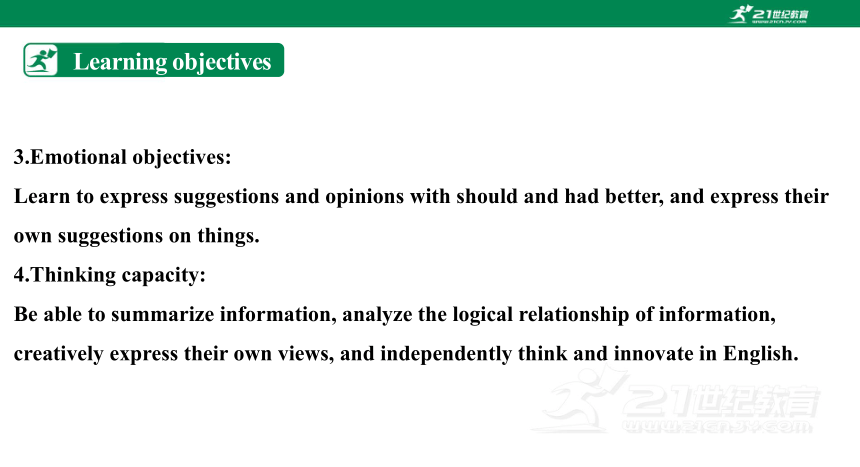
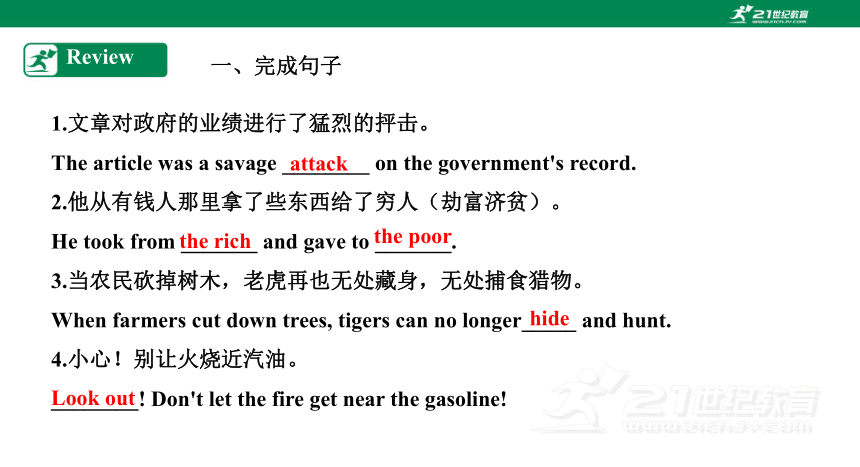
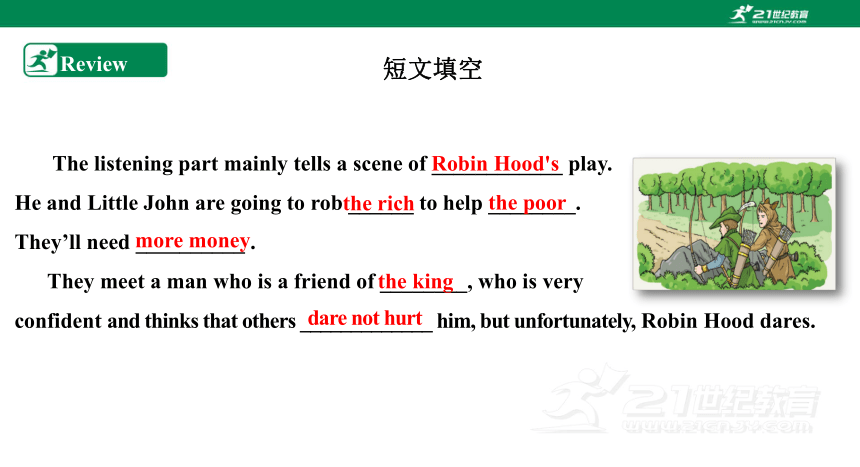
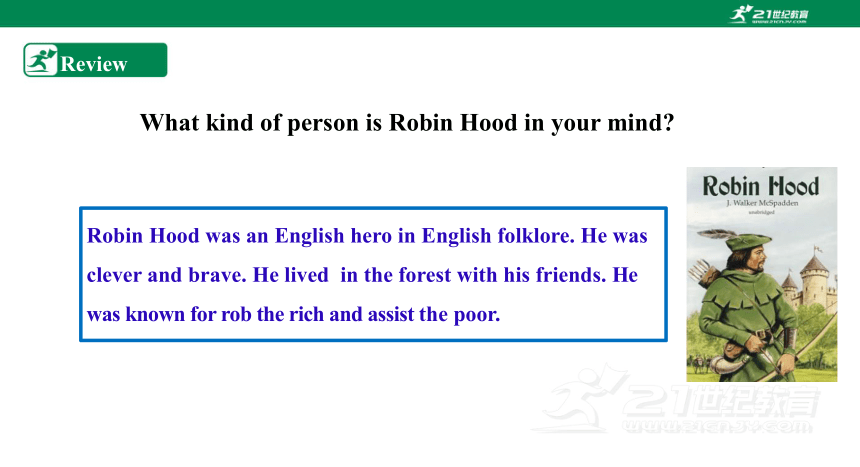
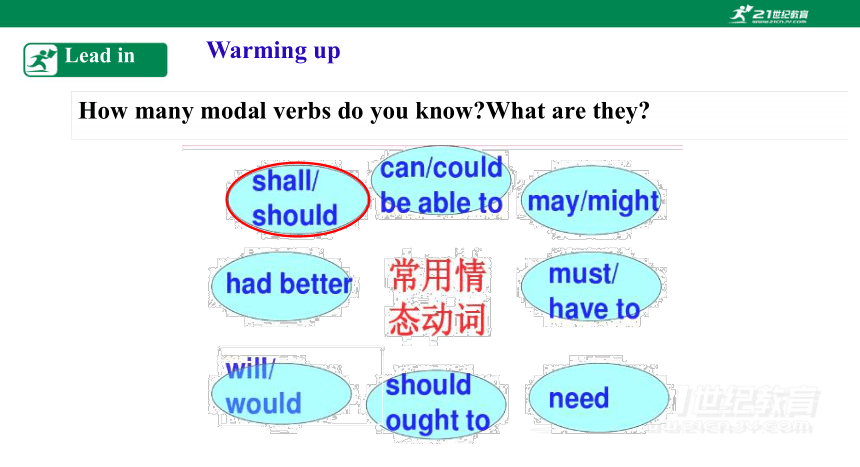
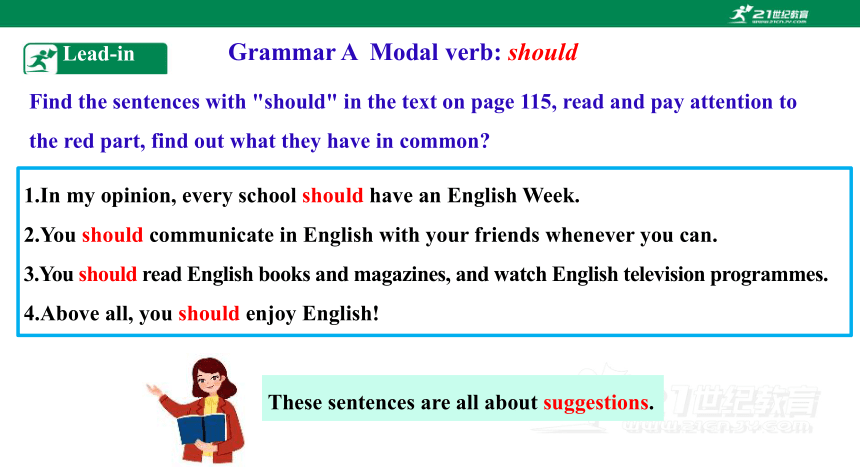
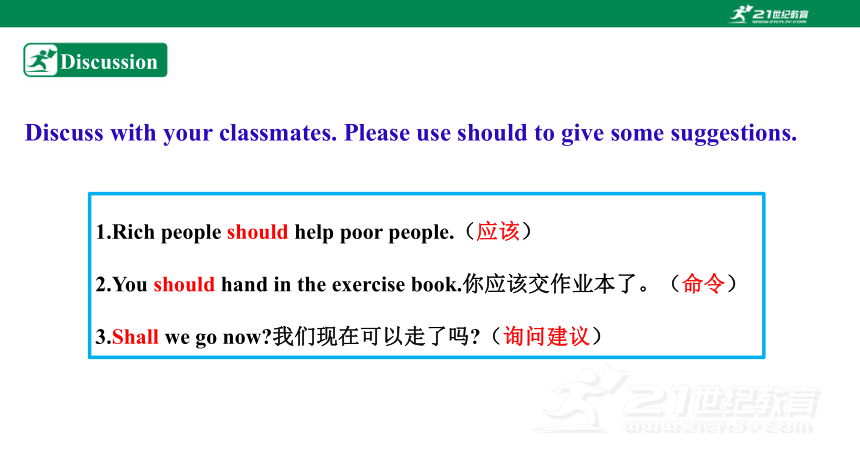
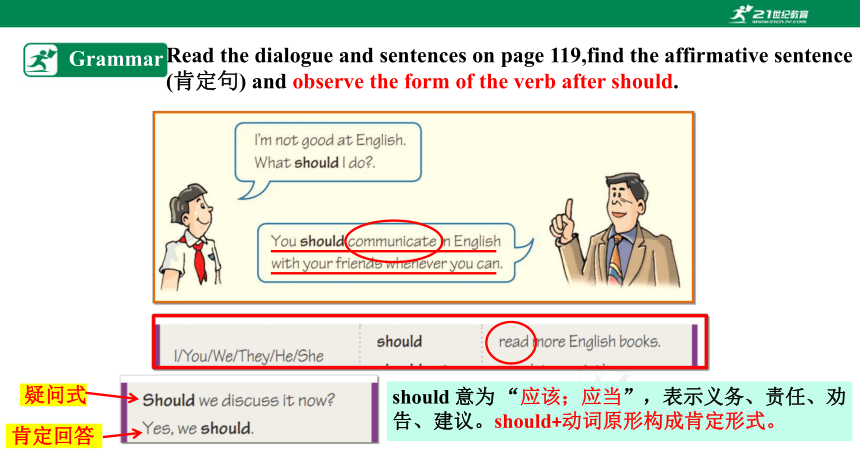
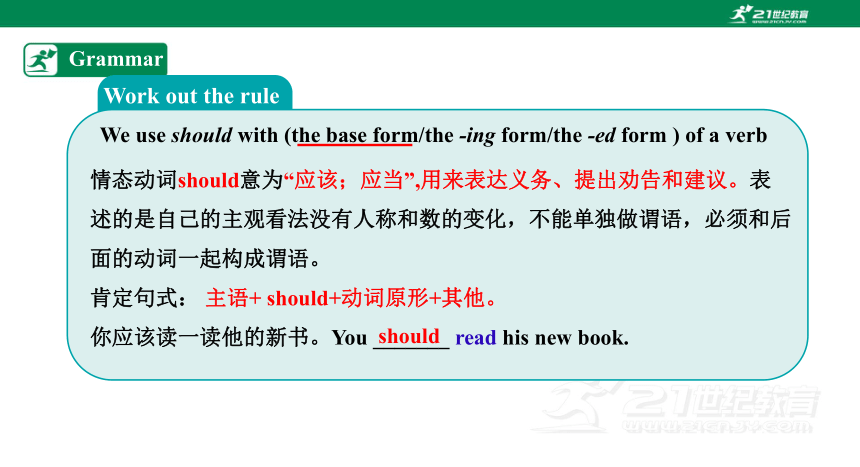
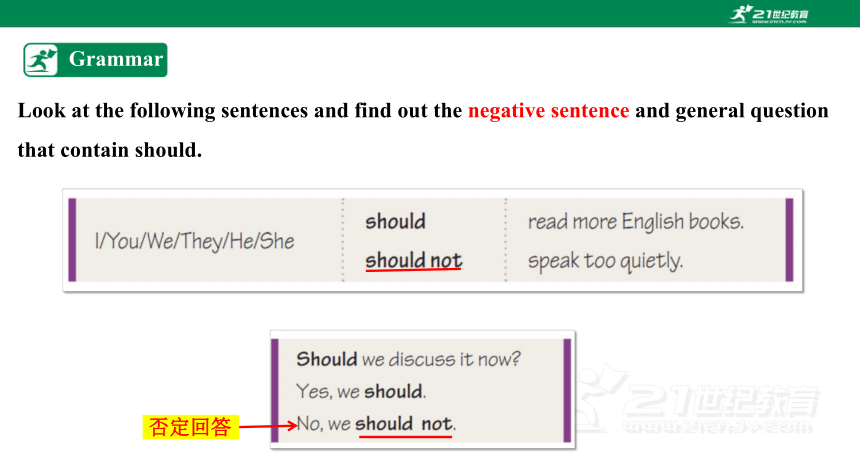
文档简介
(共38张PPT)
Unit 8 English week
Period 3 Grammar
牛津深圳·广州版八年级上册
Learning objectives
1.Knowledge objectives:
Understand the meaning and usage of the modal verb should and the phrase had better.
2.Skill objectives:
①Be able to use sentences with should to talk about obligations and responsibilities or make suggestions, indicating "should do something".
②Be able to use the sentence with had better to express advice and suggestions or a wish.
③Be able to use the modal verb should and the phrase had better to complete the dialogue with students.
Learning objectives
3.Emotional objectives:
Learn to express suggestions and opinions with should and had better, and express their own suggestions on things.
4.Thinking capacity:
Be able to summarize information, analyze the logical relationship of information, creatively express their own views, and independently think and innovate in English.
Review
1.文章对政府的业绩进行了猛烈的抨击。
The article was a savage ________ on the government's record.
2.他从有钱人那里拿了些东西给了穷人(劫富济贫)。
He took from _______ and gave to _______.
3.当农民砍掉树木,老虎再也无处藏身,无处捕食猎物。
When farmers cut down trees, tigers can no longer_____ and hunt.
4.小心!别让火烧近汽油。
________! Don't let the fire get near the gasoline!
attack
the rich
hide
the poor
Look out
一、完成句子
The listening part mainly tells a scene of ____________ play.
He and Little John are going to rob ______ to help ________.
They’ll need __________ .
They meet a man who is a friend of ________, who is very
confident and thinks that others _____________ him, but unfortunately, Robin Hood dares.
Review
短文填空
Robin Hood's
the rich
the poor
more money
the king
dare not hurt
Robin Hood was an English hero in English folklore. He was
clever and brave. He lived in the forest with his friends. He
was known for rob the rich and assist the poor.
What kind of person is Robin Hood in your mind
Review
Lead in
How many modal verbs do you know What are they
Warming up
Lead-in
Grammar A Modal verb: should
Find the sentences with "should" in the text on page 115, read and pay attention to
the red part, find out what they have in common
1.In my opinion, every school should have an English Week.
2.You should communicate in English with your friends whenever you can.
3.You should read English books and magazines, and watch English television programmes.
4.Above all, you should enjoy English!
These sentences are all about suggestions.
Discussion
Discuss with your classmates. Please use should to give some suggestions.
1.Rich people should help poor people.(应该)
2.You should hand in the exercise book.你应该交作业本了。(命令)
3.Shall we go now 我们现在可以走了吗 (询问建议)
疑问式
肯定回答
Grammar
Read the dialogue and sentences on page 119,find the affirmative sentence (肯定句) and observe the form of the verb after should.
should 意为 “应该;应当”,表示义务、责任、劝告、建议。should+动词原形构成肯定形式。
Work out the rule
We use should with (the base form/the -ing form/the -ed form ) of a verb
Grammar
情态动词should意为“应该;应当”,用来表达义务、提出劝告和建议。表述的是自己的主观看法没有人称和数的变化,不能单独做谓语,必须和后面的动词一起构成谓语。
肯定句式: 主语+ should+动词原形+其他。
你应该读一读他的新书。You _______ read his new book.
should
Grammar
Look at the following sentences and find out the negative sentence and general question that contain should.
否定回答
Work out the rule
Grammar
(1)否定句式:主语+ should +not+动词原形其他。
你不应该吃任何东西。You ____________ anything.
(2)一般疑问句式: Should+主语+动词原形其他?
我应该相信他吗?_______ I _______ him
shouldn’t eat
Should
trust
Grammar
注意:
should = ought to
shouldn’t = ought not to
should / ought to 用在疑问句中时,常用来询问他人的见解或建议。
一般疑问句:
Should we do it now
Ought we to do it now
肯定/ 否定回答:
Yes, we should. / Yes, we ought to.
No, we shouldn’t / No, we ought not to.
特殊疑问句:
When should we do it
When ought we to do it
Grammar
1.相同点
ought to与should两者均用来谈论义务和职责或提出建议,表示“应该”,两者常可替换。
It’s seven o’clock. Jack should/ought to be here at any moment.现在七点钟了,杰克应当随时到达。
2.区别
①should 表示应该、应当。例如:We should respect each other and help each other.我们应该互相尊重互相帮助。
②ought to 侧重按照法律、法规等规定,具有强制意义的责任或义务。
Every citizen ought to perform military service.每个公民都有义务服兵役。
should 和ought to 用法
1.你应该把垃圾放进垃圾桶。
__________________________________________
=_________________________________________
你应该把垃圾放进垃圾桶吗?
__________________________________________
是的,你应该。/不是,你不应该。
______________________________________________
You should put the rubbish in the bin.
You ought to put the rubbish in the bin.
In pairs, translate the following sentences.
Should you / Ought you to put the rubbish in the bin
Yes, we should/ ought to.No, we shouldn’t/ ought not to.
Practice
2.你不应该在公共场合大声说话。
You _____________ loudly in public.
= ____________________________________
你应该在公共场合大声说话吗?
______________________________________
不是,你不应该。
______________________________________
Practice
should not talk
You ought not to talk loudly in public.
In pairs, translate the following sentences.
Should you / Ought you to talk loudly in public
No, we shouldn’t./ ought not to.
3.你不应该在图书馆制造噪音。
____________________________________________
____________________________________________
=You ought not to make noise in the library.
你应该在图书馆制造噪音吗?
_________________________________________
You should not make noise in the library.
Should you / Ought you to make noise in the library
不是,你不应该。
______________________________________
No, you shouldn’t./ ought not to.
In pairs, translate the following sentences.
Practice
Ms Chen is writing a report about her students. Help her complete the
report with should or should not and the verbs from the box.
be do make pronounce read think try
should not read
should pronounce
should try
should make
should not be
should do
should
think
shy[ a ] adj.害羞的;腼腆的;羞怯的
Grammar
Discussion
We can use “had better” to give suggestions.
Group discussion,Do you know any other ways to give suggestions
1. It's half past two. I think we had better go home.
现在两点半了。我想我们最好还是回家吧。
2.You had better sit here and have a rest.
你最好在此坐坐休息一会儿。
3.You’d better be getting your clothes ready. 你最好马上把衣服准备好。
Grammar
B had better
Giving strong advice(提建议)
否定式 had better not do sth.
You
肯定式 had better do sth.
had better
句式结构
肯定式
否定式
Complete “Work out the rule” and read “Things to remember”.
had better not
Grammar
had better意思是“最好”,表示劝告、建议或愿望。其中的 had 不是 have 的过去式。在非正式场合中,had better 可以缩写为 “ 'd better”。
一、had better 格式是:had better do sth,译为“最好做某事”,可用于任何人称,无形式变化,后接动词原形。它所表达的语气很强。
例如:You had better listen to what I'm saying before you get yourself into more trouble.
你最好先听听我说的话,免得惹麻烦。
had better用法
Grammar
完成句子。
1.你脸色苍白,最好去看看医生。You look pale. ___________________ a doctor.
2.我们最好现在就走。_________________ now.
You’d better go to see
We’d better leave
had better 的否定式是:had better not 或 'd better not,译为“最好不要做某事”。
例如:I’d better not leave my bag there. Someone might steal it.
我最好不要把包留在那里。可能有人会偷。
You had better not eat so much at night.
在晚上你最好不要吃得太多。
完成句子。
1.露西,你晚上最好不要出门。Lucy, _____________________________.
2.我们最好别告诉他这件事。_______________________about it.
you’d better not go out at night
We’d better not tell him
Grammar
Practice
Complete the following sentences with had better or had better not and the expressions from the box.
You’d better not ask her to come along next time
come along一起来
see a doctor 看医生
have a picnic 野餐
I’d better sweep the floor
You’d better take an umbrella with you
You’d better not watch TV tonight
Practice
sweep the floor 扫地
take with... 随身携带......
Discussion
For example:
Discuss in pairs.What problems you have encountered in your life and study Use " had better " to give suggestions.
Student A: I met with a problem in my English practice.
Student B:________________________________________________________
—————————————————————————————————
I think that if we are in trouble,we'd better ask the teacher for help/ask the teacher to help us.
Stu dent C:I can't help wanting to play computer games recently.
Student D:____________________________________________________________
You'd better not spend too much time on computer games.
Summary
一、should的基本用法及句型
1.情态动词should意为“应该;应当”,用来表达义务、提出劝告和建议。表述的是自己的主观看法没有人称和数的变化,不能单独做谓语,必须和后面的动词一起构成谓语。
2.句型及用法:
肯定形式:should + 动词原形 否定形式:shouldn't+ 动词原形
一般疑问句形式:直接将should置于句首
二、should与ought to 的用法
1.相同点
ought to与should两者均用来谈论义务和职责或提出建议,表示“应该”,两者常可替换。
2.区别
①should 表示应该、应当。②ought to 侧重按照法律、法规等规定,具有强制意义的责任或义务。
Summary
三、had better的用法
1.had better意思是“最好”,表示劝告、建议或愿望。其中的 had 不是 have 的过去式。在非正式场合中,had better 可以缩写为 “ 'd better”。
2.句型及用法:
肯定形式:had better do sth
否定形式:had better not do sth
(注意:had在这里不是have的过去式,不随人称和时态发生改变)
Summary
1. shy adj.害羞的;腼腆的;羞怯的
2. be good at = do well in 擅长
3. all the time 一直;总是
4. on time 准时
5. in time 及时
6. come along 一起来
7. see a doctor 看医生
8. sweep the floor 扫地
9. take…with... 随身携带…
10. have a picnic 野餐
Key words and phrases
Language point
1. Ought to is similar in meaning to should. ought to和should在意思上相似。
(1)ought to (情态动间)应该
后接动词原形,构成ought to do sth.结构。此结构变疑问句时,只需将ought提前,而不是将ought to提前。变否定句时,在ought后面加not,而不是在ought to的后面加not。
——Ought I to tell her the truth 我应该把真相告诉地吗
——Yes, I think you ought (to).是的,我觉得你应该。
完成句子
你不应该在外面待到这么晚。
You __________________ so late.
oughtn't to stay out
Language point
(2) meaning[名词] 意思;含义
What's the meaning of the word 这个单词是什么意思
拓展①mean [动词]意思是其常见句型“What do/does...mean ”意“......是什么意思 ”。
What does "treasure" mean "treasure"是什么意思
②meaningful[形容词]有意义的;其反义词为meaningless,意为“毫无意义的"。
I think these storybooks are very meaningful.我认为这些故事书很有意义。
完成句子
露西认为肥皂剧毫无意义。
Lucy thinks soap operas are ____________.
meaningless
2.She (5) should not be to shy.她(5)应该太害羞。
[副词]太
(1) too
可饰形容词或剧词,作状语,表示程度。He speaks too fast.他讲话太快了。
拓展
副词too是一个较为常见的词,主要用法如下:
①“too+形容词/副词+ (for sb.+)to do sth”意为“(对某人来说)......而不能做某事”。
The boy is too young to look after himself.这个男孩太小了,不能照顾自己。
②too可用于肯定句句末,有“也,还”之意。
I know the answer, too.我也知道答案。
(沈阳中考)
The train travelled______fast for us to see much outside the window.
A. quite B. very C. too D. so
Language point
C
Language point
2.She (5) should not be to shy.她(5)应该太害羞。
(1)shy[ a ] adj.害羞的;腼腆的;羞怯的
She was too shy to ask anyone for help.她太腼腆,不愿向任何人求助。
The children were shy at first, but soon lost their inhibitions. 孩子们起初很羞涩,但很快就放开了。
根据中文含义填空
She's a ____ (腼腆的) girl who needs friends to bring her out of herself.
shy
1. We should take good care of the young trees. (改为一般疑问句)
_______ we ______ good care of the young trees
2. You ought to turn off the lights when you leave the room.(改为一般疑问句)
_______ I _____ _____ off the lights when I leave the room
3. You ought to put your bike under the tree.(改为否定句)
You _____ ____ ____ ____ your bike under the tree.
4. The child should drink some orange juice.(改为否定句)
The child _______ ______ ______ orange juice.
5. They should arrive at the station before 7 o'clock. (就划线部分提问)
______ ______ ______ ______ at the station
Should take
Ought to turn
一、根据要求完成句子。
ought not to put
shouldn’t drink any
When should they arrive
Practice
What ______ I do Can you give me some advice.
A. had B. did C. should D. would
2. It’s raining heavily outside. You _________ leave now.
A. had better B. ought to C. had better not to D. had better not
3. You'd better ______late next time.
A. not to be B. not be C. won't be D. don't be
4. ——Shall I wash my clothes right now
A. You’d better. B. You’d better not do. C. You’d not better.
5. There is only five minutes left. You _________ hurry up.
A. should B. ought to C. had better D. have better
Exercise
√
√
√
√
√
Homework
Homework
1.Review the usage of should, ought to, had better.
2.Complete the classroom exercises.
Unit 8 English week
Period 3 Grammar
牛津深圳·广州版八年级上册
Learning objectives
1.Knowledge objectives:
Understand the meaning and usage of the modal verb should and the phrase had better.
2.Skill objectives:
①Be able to use sentences with should to talk about obligations and responsibilities or make suggestions, indicating "should do something".
②Be able to use the sentence with had better to express advice and suggestions or a wish.
③Be able to use the modal verb should and the phrase had better to complete the dialogue with students.
Learning objectives
3.Emotional objectives:
Learn to express suggestions and opinions with should and had better, and express their own suggestions on things.
4.Thinking capacity:
Be able to summarize information, analyze the logical relationship of information, creatively express their own views, and independently think and innovate in English.
Review
1.文章对政府的业绩进行了猛烈的抨击。
The article was a savage ________ on the government's record.
2.他从有钱人那里拿了些东西给了穷人(劫富济贫)。
He took from _______ and gave to _______.
3.当农民砍掉树木,老虎再也无处藏身,无处捕食猎物。
When farmers cut down trees, tigers can no longer_____ and hunt.
4.小心!别让火烧近汽油。
________! Don't let the fire get near the gasoline!
attack
the rich
hide
the poor
Look out
一、完成句子
The listening part mainly tells a scene of ____________ play.
He and Little John are going to rob ______ to help ________.
They’ll need __________ .
They meet a man who is a friend of ________, who is very
confident and thinks that others _____________ him, but unfortunately, Robin Hood dares.
Review
短文填空
Robin Hood's
the rich
the poor
more money
the king
dare not hurt
Robin Hood was an English hero in English folklore. He was
clever and brave. He lived in the forest with his friends. He
was known for rob the rich and assist the poor.
What kind of person is Robin Hood in your mind
Review
Lead in
How many modal verbs do you know What are they
Warming up
Lead-in
Grammar A Modal verb: should
Find the sentences with "should" in the text on page 115, read and pay attention to
the red part, find out what they have in common
1.In my opinion, every school should have an English Week.
2.You should communicate in English with your friends whenever you can.
3.You should read English books and magazines, and watch English television programmes.
4.Above all, you should enjoy English!
These sentences are all about suggestions.
Discussion
Discuss with your classmates. Please use should to give some suggestions.
1.Rich people should help poor people.(应该)
2.You should hand in the exercise book.你应该交作业本了。(命令)
3.Shall we go now 我们现在可以走了吗 (询问建议)
疑问式
肯定回答
Grammar
Read the dialogue and sentences on page 119,find the affirmative sentence (肯定句) and observe the form of the verb after should.
should 意为 “应该;应当”,表示义务、责任、劝告、建议。should+动词原形构成肯定形式。
Work out the rule
We use should with (the base form/the -ing form/the -ed form ) of a verb
Grammar
情态动词should意为“应该;应当”,用来表达义务、提出劝告和建议。表述的是自己的主观看法没有人称和数的变化,不能单独做谓语,必须和后面的动词一起构成谓语。
肯定句式: 主语+ should+动词原形+其他。
你应该读一读他的新书。You _______ read his new book.
should
Grammar
Look at the following sentences and find out the negative sentence and general question that contain should.
否定回答
Work out the rule
Grammar
(1)否定句式:主语+ should +not+动词原形其他。
你不应该吃任何东西。You ____________ anything.
(2)一般疑问句式: Should+主语+动词原形其他?
我应该相信他吗?_______ I _______ him
shouldn’t eat
Should
trust
Grammar
注意:
should = ought to
shouldn’t = ought not to
should / ought to 用在疑问句中时,常用来询问他人的见解或建议。
一般疑问句:
Should we do it now
Ought we to do it now
肯定/ 否定回答:
Yes, we should. / Yes, we ought to.
No, we shouldn’t / No, we ought not to.
特殊疑问句:
When should we do it
When ought we to do it
Grammar
1.相同点
ought to与should两者均用来谈论义务和职责或提出建议,表示“应该”,两者常可替换。
It’s seven o’clock. Jack should/ought to be here at any moment.现在七点钟了,杰克应当随时到达。
2.区别
①should 表示应该、应当。例如:We should respect each other and help each other.我们应该互相尊重互相帮助。
②ought to 侧重按照法律、法规等规定,具有强制意义的责任或义务。
Every citizen ought to perform military service.每个公民都有义务服兵役。
should 和ought to 用法
1.你应该把垃圾放进垃圾桶。
__________________________________________
=_________________________________________
你应该把垃圾放进垃圾桶吗?
__________________________________________
是的,你应该。/不是,你不应该。
______________________________________________
You should put the rubbish in the bin.
You ought to put the rubbish in the bin.
In pairs, translate the following sentences.
Should you / Ought you to put the rubbish in the bin
Yes, we should/ ought to.No, we shouldn’t/ ought not to.
Practice
2.你不应该在公共场合大声说话。
You _____________ loudly in public.
= ____________________________________
你应该在公共场合大声说话吗?
______________________________________
不是,你不应该。
______________________________________
Practice
should not talk
You ought not to talk loudly in public.
In pairs, translate the following sentences.
Should you / Ought you to talk loudly in public
No, we shouldn’t./ ought not to.
3.你不应该在图书馆制造噪音。
____________________________________________
____________________________________________
=You ought not to make noise in the library.
你应该在图书馆制造噪音吗?
_________________________________________
You should not make noise in the library.
Should you / Ought you to make noise in the library
不是,你不应该。
______________________________________
No, you shouldn’t./ ought not to.
In pairs, translate the following sentences.
Practice
Ms Chen is writing a report about her students. Help her complete the
report with should or should not and the verbs from the box.
be do make pronounce read think try
should not read
should pronounce
should try
should make
should not be
should do
should
think
shy[ a ] adj.害羞的;腼腆的;羞怯的
Grammar
Discussion
We can use “had better” to give suggestions.
Group discussion,Do you know any other ways to give suggestions
1. It's half past two. I think we had better go home.
现在两点半了。我想我们最好还是回家吧。
2.You had better sit here and have a rest.
你最好在此坐坐休息一会儿。
3.You’d better be getting your clothes ready. 你最好马上把衣服准备好。
Grammar
B had better
Giving strong advice(提建议)
否定式 had better not do sth.
You
肯定式 had better do sth.
had better
句式结构
肯定式
否定式
Complete “Work out the rule” and read “Things to remember”.
had better not
Grammar
had better意思是“最好”,表示劝告、建议或愿望。其中的 had 不是 have 的过去式。在非正式场合中,had better 可以缩写为 “ 'd better”。
一、had better 格式是:had better do sth,译为“最好做某事”,可用于任何人称,无形式变化,后接动词原形。它所表达的语气很强。
例如:You had better listen to what I'm saying before you get yourself into more trouble.
你最好先听听我说的话,免得惹麻烦。
had better用法
Grammar
完成句子。
1.你脸色苍白,最好去看看医生。You look pale. ___________________ a doctor.
2.我们最好现在就走。_________________ now.
You’d better go to see
We’d better leave
had better 的否定式是:had better not 或 'd better not,译为“最好不要做某事”。
例如:I’d better not leave my bag there. Someone might steal it.
我最好不要把包留在那里。可能有人会偷。
You had better not eat so much at night.
在晚上你最好不要吃得太多。
完成句子。
1.露西,你晚上最好不要出门。Lucy, _____________________________.
2.我们最好别告诉他这件事。_______________________about it.
you’d better not go out at night
We’d better not tell him
Grammar
Practice
Complete the following sentences with had better or had better not and the expressions from the box.
You’d better not ask her to come along next time
come along一起来
see a doctor 看医生
have a picnic 野餐
I’d better sweep the floor
You’d better take an umbrella with you
You’d better not watch TV tonight
Practice
sweep the floor 扫地
take with... 随身携带......
Discussion
For example:
Discuss in pairs.What problems you have encountered in your life and study Use " had better " to give suggestions.
Student A: I met with a problem in my English practice.
Student B:________________________________________________________
—————————————————————————————————
I think that if we are in trouble,we'd better ask the teacher for help/ask the teacher to help us.
Stu dent C:I can't help wanting to play computer games recently.
Student D:____________________________________________________________
You'd better not spend too much time on computer games.
Summary
一、should的基本用法及句型
1.情态动词should意为“应该;应当”,用来表达义务、提出劝告和建议。表述的是自己的主观看法没有人称和数的变化,不能单独做谓语,必须和后面的动词一起构成谓语。
2.句型及用法:
肯定形式:should + 动词原形 否定形式:shouldn't+ 动词原形
一般疑问句形式:直接将should置于句首
二、should与ought to 的用法
1.相同点
ought to与should两者均用来谈论义务和职责或提出建议,表示“应该”,两者常可替换。
2.区别
①should 表示应该、应当。②ought to 侧重按照法律、法规等规定,具有强制意义的责任或义务。
Summary
三、had better的用法
1.had better意思是“最好”,表示劝告、建议或愿望。其中的 had 不是 have 的过去式。在非正式场合中,had better 可以缩写为 “ 'd better”。
2.句型及用法:
肯定形式:had better do sth
否定形式:had better not do sth
(注意:had在这里不是have的过去式,不随人称和时态发生改变)
Summary
1. shy adj.害羞的;腼腆的;羞怯的
2. be good at = do well in 擅长
3. all the time 一直;总是
4. on time 准时
5. in time 及时
6. come along 一起来
7. see a doctor 看医生
8. sweep the floor 扫地
9. take…with... 随身携带…
10. have a picnic 野餐
Key words and phrases
Language point
1. Ought to is similar in meaning to should. ought to和should在意思上相似。
(1)ought to (情态动间)应该
后接动词原形,构成ought to do sth.结构。此结构变疑问句时,只需将ought提前,而不是将ought to提前。变否定句时,在ought后面加not,而不是在ought to的后面加not。
——Ought I to tell her the truth 我应该把真相告诉地吗
——Yes, I think you ought (to).是的,我觉得你应该。
完成句子
你不应该在外面待到这么晚。
You __________________ so late.
oughtn't to stay out
Language point
(2) meaning[名词] 意思;含义
What's the meaning of the word 这个单词是什么意思
拓展①mean [动词]意思是其常见句型“What do/does...mean ”意“......是什么意思 ”。
What does "treasure" mean "treasure"是什么意思
②meaningful[形容词]有意义的;其反义词为meaningless,意为“毫无意义的"。
I think these storybooks are very meaningful.我认为这些故事书很有意义。
完成句子
露西认为肥皂剧毫无意义。
Lucy thinks soap operas are ____________.
meaningless
2.She (5) should not be to shy.她(5)应该太害羞。
[副词]太
(1) too
可饰形容词或剧词,作状语,表示程度。He speaks too fast.他讲话太快了。
拓展
副词too是一个较为常见的词,主要用法如下:
①“too+形容词/副词+ (for sb.+)to do sth”意为“(对某人来说)......而不能做某事”。
The boy is too young to look after himself.这个男孩太小了,不能照顾自己。
②too可用于肯定句句末,有“也,还”之意。
I know the answer, too.我也知道答案。
(沈阳中考)
The train travelled______fast for us to see much outside the window.
A. quite B. very C. too D. so
Language point
C
Language point
2.She (5) should not be to shy.她(5)应该太害羞。
(1)shy[ a ] adj.害羞的;腼腆的;羞怯的
She was too shy to ask anyone for help.她太腼腆,不愿向任何人求助。
The children were shy at first, but soon lost their inhibitions. 孩子们起初很羞涩,但很快就放开了。
根据中文含义填空
She's a ____ (腼腆的) girl who needs friends to bring her out of herself.
shy
1. We should take good care of the young trees. (改为一般疑问句)
_______ we ______ good care of the young trees
2. You ought to turn off the lights when you leave the room.(改为一般疑问句)
_______ I _____ _____ off the lights when I leave the room
3. You ought to put your bike under the tree.(改为否定句)
You _____ ____ ____ ____ your bike under the tree.
4. The child should drink some orange juice.(改为否定句)
The child _______ ______ ______ orange juice.
5. They should arrive at the station before 7 o'clock. (就划线部分提问)
______ ______ ______ ______ at the station
Should take
Ought to turn
一、根据要求完成句子。
ought not to put
shouldn’t drink any
When should they arrive
Practice
What ______ I do Can you give me some advice.
A. had B. did C. should D. would
2. It’s raining heavily outside. You _________ leave now.
A. had better B. ought to C. had better not to D. had better not
3. You'd better ______late next time.
A. not to be B. not be C. won't be D. don't be
4. ——Shall I wash my clothes right now
A. You’d better. B. You’d better not do. C. You’d not better.
5. There is only five minutes left. You _________ hurry up.
A. should B. ought to C. had better D. have better
Exercise
√
√
√
√
√
Homework
Homework
1.Review the usage of should, ought to, had better.
2.Complete the classroom exercises.
